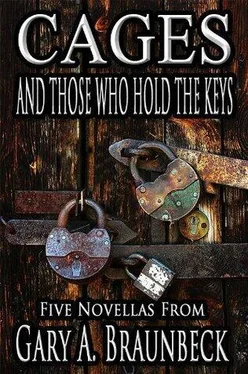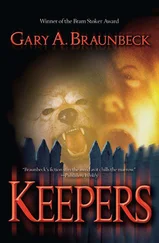“We still friends?” I asked him. I didn’t want to make him cry; he was the closest thing I had to an older brother.
Timmy wiped his eyes, then pulled in a deep breath and patted my arm, smiling. “Terrible, just terrible.” Said in the same tone as, Don’t ask me dumb questions.
I pressed one of my hands over his and nodded my head.
Ethel finished getting all her things together, and was just about to head back to the Reverend’s office when he came barreling through the swinging doors like a man with a
pissed-off pit bull snapping at his butt. The Reverend is not known for displays of panic, but one look at the expression on his face and all three of us knew something bad had happened.
As if he knew what we were thinking (which wouldn’t surprise me), the Reverend came to a sudden stop, looked up, and tried to smile like nothing was wrong.
“That man couldn’t lie if his life depended on it,” said Ethel.
“What do you suppose it is?” I asked.
Timmy said, “Terrible, just… terrible .”
It was the way he said that last “terrible” that made me and Ethel look at him. Timmy sounded genuinely scared. I patted his shoulder and told him everything would be all right.
The Reverend took a deep breath, held it, then let it out in a quick puff before starting toward us again, slower this time, smiling like someone had just stuck a gun in his back and told him to act natural.
“Some night, eh?” he said.
“Oh, will you can it with the easygoing routine?” said Ethel. “Ain’t none of us blind, we saw you do that Jesse Owens through the doors. What’s wrong?”
“I…” The Reverend looked into Ethel’s eyes and shrugged. “I honestly can’t say—and, no, I don’t mean that I won’t say; I honestly don’t know what’s wrong.” He ran a hand through his hair. “Martha come back yet?”
“No,” said Ethel. “And neither has Joe. What was troubling him, anyway?”
The Reverend walked closer to the front door and stood there a moment, staring out at the freezing rain. “It’s a bad night, Ethel. Nights like this, they make some people think too much. If you think too much, you start remembering things, and some of those things are best left forgotten.”
“You get that from a fortune cookie?”
The Reverend turned to face her. “Beg pardon?”
Ethel sighed. “I asked you what I thought was a fairly direct question, and what do I get for an answer?—gobbledygook that sounds like something from an Igmar Bergman movie.”
“You know Bergman?”
Ethel stood up a little straighter, as if trying to decide whether or not she should be offended. “ Yes , I know Bergman movies. I also like Kurosawa and Fellini and think The Three Stooges are very funny. And you’re changing the subject. I asked you what was wrong with Joe?”
“He’s dealing with some bad memories.”
Ethel finished getting ready to leave, handing the Reverend the money envelope. “You can’t save the world, Reverend. Only that part of it that comes through these doors and chooses to stay.” He took the money from her and grinned. “When I grow up, I want to be just like you.” “You’d look terrible in my wardrobe, you’re an Autumn.” He shook the envelope. “Ah…sounds like…let me guess…twenty dollars?” “Learn to juggle while blindfolded and you could take that act on the road.” The Reverend laughed. “Oh, Ethel…what would I do without you?”
“ Don’t you be sweet-talking me, mister. I’m immune to your charms.”
“No you’re not.”
Ethel smiled; her smile is a wonderful thing to behold. “No, I’m not, but we can’t have you thinking you’re special or anything like that, now, can we?” She kissed his cheek, smiled at me and Timmy, and was just going out the door at the same time Sheriff Ted Jackson was coming in. The sheriff stood aside and held the door open for her.
“Evenin’, Sheriff,” said Ethel. “There some kind of trouble?”
“Only my troubled heart— why won’t you run off with me, Ethel, why?”
She laughed and smacked his arm. “Ted, one of these days I’m gonna take you up on that, and then what’ll you do?”
“Rejoice. Sing. Dance in the street.”
Ethel shook her head. “You men . What goes on in those heads of yours?”
“Sweet dreams of holding you in my arms, Ethel,” said Jackson. As Ethel walked away toward her car, Jackson called out: “Don’t leave me! I’ll crumble. I love you. Come back!”
I looked at Timmy. “Wow. Two floor shows tonight.”
Timmy snorted a mischievous laugh and said, in a conspiratorial tone, “Terrible, just terrible .”
Jackson came inside, closing the door behind him. “You know, some night that woman is going to haul off and knock my teeth down my throat. And I’ll probably deserve it.”
“I keep a camera at the ready for that very day,” replied the Reverend. He shook Jackson’s hand. “Thanks for coming, Ted.”
Jackson shrugged. “My social calendar suddenly cleared up.”
We all knew that Jackson’s wife had left him after she miscarried. She’s living down in Oregon with her sister now. Jackson was elected Sheriff last year, after having served as a deputy for something like six years. The new title and new uniform and new power hadn’t changed him at all; he still looked like he was waiting for someone to come out of the shadows and take it all away from him. He and the Reverend both have a tense, lonely way about them, which is I guess what drew them together as friends. I couldn’t for the life of me figure out what they had in common, but I guess that doesn’t really matter when there’s someone you can always depend on for company and small talk over a cup of coffee or a sandwich or a smoke.
They stood there chatting about Jackson’s new responsibilities, the upcoming City Council budget meetings, the weather, and just when I was about to interrupt and ask what was going on, Jackson said, “So how long you need me here?” The Reverend checked his watch. “An hour, two at the most.” “What’s going on?” I asked. “Popsicle Patrol,” said the Reverend. “You need to go warm up the van.”
I looked out at the freezing rain—which was coming down even harder than before—and nodded my head. “I was wondering if we were going to do that tonight.” And I had been. I said good-bye to Timmy and was making my way toward the back when a little voice behind me said: “Mister, the tape won’t play.”
She stood there in all her three-year-old radiance, mussed hair, a smudge on one of her cheeks, hands on hips, one foot impatiently tapping, lower lip sticking out in what I’d bet was a well-practiced pout. I wanted to wrap her up and take her home with me.
“Is the tape broken?” I said, kneeling down so we could see eye to eye.
She tsk ’d, rolled her eyes, and sighed. “ Noooooo , it’s not broken. It just won’t play . They’re not the same thing, y’know.”
I looked toward the “lounge”—an area near one of the corners with three chairs, a sofa, a coffee table, and a television set—and saw the girl’s mother, brother, and dog staring at us. The dog in particular seemed irritated that the tape wasn’t doing its part to share in the duties of entertaining the kids. I told the little girl I’d see what I could do, and she grabbed my hand, dragging me toward the TV.
As soon as I knelt down in front of it I saw the problem. “It’s not the tape, honey—the VCR has to be set on Channel 3 or it doesn’t come through the TV.”
“Well, did you set it?”
“Missy!” said her mother. Then, to me: “Sorry. She really wants to watch the tape and she gets…a little impatient.”
Читать дальше












